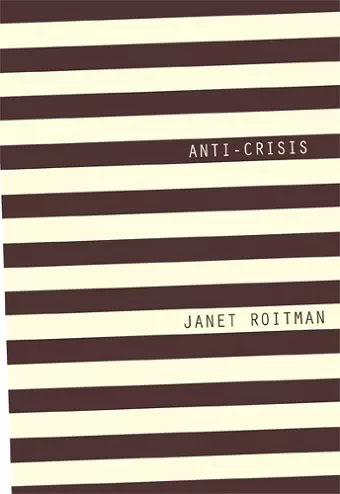Anti-Crisis
Format:Hardback
Publisher:Duke University Press
Published:20th Nov '13
Currently unavailable, and unfortunately no date known when it will be back

Taking the so-called subprime mortgage crisis as her case study, Janet Roitman analyzes "crisis" as a narrative device, explaining how the term enables some narratives and questions while foreclosing others.
Crisis is everywhere: in Iraq, Afghanistan, Syria, and the Congo; in housing markets, money markets, financial systems, state budgets, and sovereign currencies. In Anti-Crisis, Janet Roitman steps back from the cycle of crisis production to ask not just why we declare so many crises but also what sort of analytical work the concept of crisis enables. What, she asks, are the stakes of crisis? Taking responses to the so-called subprime mortgage crisis of 2007–2008 as her case in point, Roitman engages with the work of thinkers ranging from Reinhart Koselleck to Michael Lewis, and from Thomas Hobbes to Robert Shiller. In the process, she questions the bases for claims to crisis and shows how crisis functions as a narrative device, or how the invocation of crisis in contemporary accounts of the financial meltdown enables particular narratives, raising certain questions while foreclosing others.
“One of the great strengths of Roitman’s book is that by analysing how we come to view certain events as being indications of a ‘crisis’, she also sheds light on the way we construct our notion of ‘normalcy.’ . . . Anti-Crisis is clearly the product of a serious attempt to think outside the usual academic boxes, and as such it deserves much praise. It is to Roitman’s credit, and to the reader’s benefit, that she largely succeeds in her aim to illuminate the notion of crisis as an object of knowledge.” -- Luke McDonagh * LSE Review of Books *
“Anti-Crisis is an engaging, timely, and provocative critical analysis of contemporary crisis narratives. It does work that few others have undertaken by plumbing the roots of crisis as a historico-philosophical concept and approaching its narration as a discursive tool for the defense of the status quo and the interests animating it. Roitman does a superb job of excavating and analyzing the technical practices that allowed for what were at one moment regarded as legitimate and lucrative practices of debt capitalization to be transfigured in the next moment into toxic obligations requiring public bailouts in order to rescue the world as we know it.” -- Alex Khasnabish * Anthropological Quarterly *
“Roitman’s book fulfills multiple timely and important tasks. . . . Roitman therefore calls attention to the contingent practices which constitute normality as institutional legitimacy. . . . The merit of this perspective is that it restores politicality both in and beyond crisis conditions.” -- Sascha Engel * New Political Science *
“Anti-Crisis draws our attention to a range of key issues in social theory: critique and crisis are cognates whereby crisis is necessary for the enunciation of critique and that crisis may be understood as a blind spot that regulates narratives about contemporary history—enabling and disenabling certain questions. Ultimately, Roitman’s elaboration of crisis is significant insofar as it is understood, not as a condition, but as an observation about history that generates meanings — meanings that are contested and the product of particular ideological vantage points.” -- Jude Fokwang * Anthropology of Southern Africa *
“The book offers important insights for ethnography insofar as crisis is either a backdrop for many ethnographic projects. . . . Furthermore, our discipline’s increasing focus on problems rather than ethnoi will require anthropologists to reflect carefully on articulations of crisis. Conceptual work is delicate business, which Roitman handles with aplomb. Anti-Crisis offers an important caution for those engaged in ethnographic work: fieldworkers should be attentive to the overlaps and differences between the concepts used by participants in research and the concepts deployed in analysis.” -- Daromir Rudnyckyj * American Ethnologist *
"An immensely rich, atypical and inspiring account of the calculus of crisis." -- Radman Selmic * Journal of Cultural Economy *
"Well written and provocative, Anti-Crisis makes a great contribution to conceptual anthropology. By dislodging a key term in contemporary critical theories, it poses an exciting challenge to scholars within and beyond the discipline, at the same time reasserting anthropology’s broader intellectual relevance." -- Amalia Sa’ar * American Anthropologist *
ISBN: 9780822355120
Dimensions: unknown
Weight: 386g
176 pages